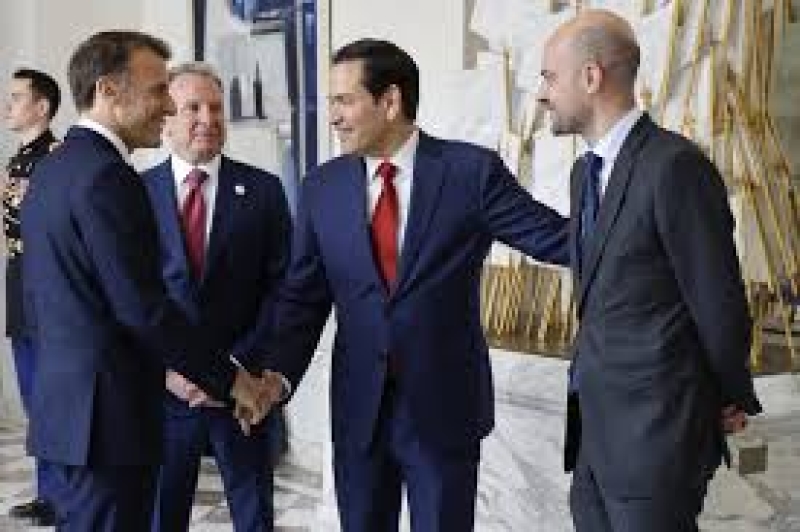- Fakhrul condemns attacks on media, calls for unity, justice |
- 2 cops among 4 hurt in clash outside Indian Assit H.C. in Ctg |
- Inqilab Moncho urges people to avoid violence |
- Hadi’s death: Prothom Alo, Daily Star offices set afire |
- সন্ধ্যায় পৌঁছাবে হাদির মরদেহ, জানাজা শনিবার |
France Hails Progress in US-Europe Ukraine Peace Talks

France welcomed renewed international talks on ending the war in Ukraine, calling discussions between top U.S. and European officials on Thursday a “positive process” as efforts to involve Europe more directly in peace negotiations gained momentum.
The high-level meetings in Paris brought together French President Emmanuel Macron, U.S. Secretary of State Marco Rubio, U.S. envoy Steve Witkoff, British Foreign Secretary David Lammy, German officials, and Ukrainian ministers. The discussions focused on advancing a U.S.-proposed peace framework, amid faltering efforts by President Donald Trump to secure a full truce with Russia.
“Today in Paris, we launched a positive process in which Europeans are directly engaged,” Macron’s office said in a statement. “This marks a crucial step toward a coordinated approach for lasting peace in Ukraine.”
A follow-up meeting is scheduled for next week in London, involving envoys from the U.S., France, Britain, Germany, and Ukraine, signaling a more unified front among Western allies.
US Pushes Peace Framework
Secretary Rubio, who has become the administration's key diplomatic figure on Ukraine, emphasized Washington’s commitment to ending the conflict. He briefed Russian Foreign Minister Sergei Lavrov following the Paris talks, reiterating the U.S. peace proposal.
“President Trump and the United States want this war to end. We’ve presented a clear framework for a durable and lasting peace,” Rubio said, according to the U.S. State Department. “The encouraging reception in Paris shows that peace is possible if all parties engage constructively.”
Russia's foreign ministry confirmed that Lavrov had spoken with Rubio and “reaffirmed Moscow’s readiness” to address the root causes of the conflict. Both sides agreed to maintain open communication channels ahead of the London talks.
Europe Reasserts Its Role
France and Britain have been working to ensure Europe is not sidelined in the peace process, especially after Trump initiated direct talks with Russia earlier this year. French Foreign Minister Jean-Noel Barrot said the Paris talks marked a breakthrough.
“For the first time, the United States, Ukraine, and key European ministers sat around the same table,” Barrot told reporters. “A just and lasting peace can only be achieved with European involvement.”
Macron described the talks as “a very important occasion for convergence,” adding that all participants sought a “robust and sustainable peace.”
Zelensky’s Cautious Optimism
Ukrainian President Volodymyr Zelensky, who has had tense relations with the Trump administration, cautiously welcomed the diplomatic efforts. In a post on X (formerly Twitter), he stressed the importance of dialogue.
“It is essential that we listen to each other, refine our positions, and work toward genuine security for Ukraine and for all of Europe,” he wrote.
However, Zelensky also expressed concern over recent remarks by U.S. envoy Steve Witkoff, accusing him of echoing Russian talking points. Witkoff had suggested a peace deal might involve compromises on Ukraine’s occupied territories.
“I believe Mr. Witkoff is adopting the strategy of the Russian side,” Zelensky told reporters. “Whether consciously or not, he is spreading Russian narratives, which is very dangerous.”
Witkoff, who has met with Russian President Vladimir Putin three times since Trump’s return to the White House, said Putin is open to “permanent peace” following their latest talks in Saint Petersburg.
Kremlin Skepticism
The Kremlin, however, remains dismissive of the European push. Spokesman Dmitry Peskov criticized the Paris talks, suggesting that European leaders remain focused on prolonging the conflict rather than ending it.
Meanwhile, continued Russian strikes—including recent bombings that killed civilians and children in Ukrainian cities—have added urgency to the diplomatic push.
As tensions persist, the next round of talks in London will test whether the fragile diplomatic momentum can solidify into a path toward a real ceasefire—and, ultimately, peace.

